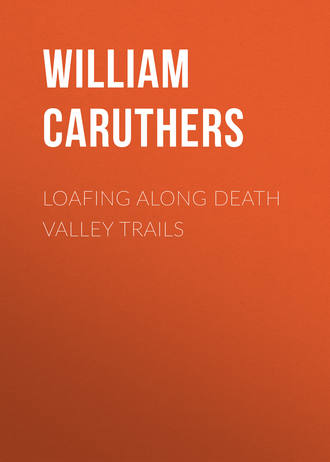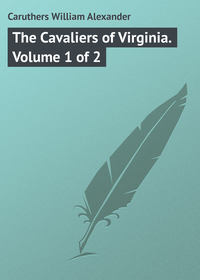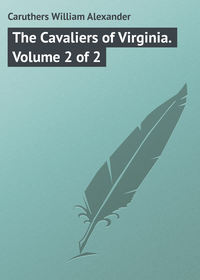 полная версия
полная версияLoafing Along Death Valley Trails
A curious story of a man haunted by his conscience is that of William Dooley and told to me by Dr. Samuel Slocum, who had come to Randsburg from Arizona after making a fortune in gold.
A howling blizzard had driven everyone from the streets and the campers in Fiddlers’ Gulch into Billy Hevron’s saloon. Dr. Slocum, lost in the blinding snow and stumbling along the street, felt with his hands for walls he couldn’t see, while a barroom noise guided him to the door.
At the bar he saw William Paddock, mining engineer. “Bill, you’re the man I’m looking for. I can’t find anyone who can tell me how to get to Goler Canyon in Panamint Valley. You’ve been there and I want you to draw me a map.”
Paddock, finishing a drink ordered one for Slocum and introduced him to a man at his side: “This is Mr. Dooley,” Paddock said, and the doctor saw a great hulk of a man with black whiskers, small eyes, and an uneasy look. Before a word was spoken Slocum sensed Dooley’s instant dislike of him.
Slocum ordered a round of drinks. Dooley refused and walked to the farther end of the bar.
Paddock followed Dooley after a moment, talked with him and returned to his drink. He said to Slocum: “I’m in a curious situation. I don’t know much about Dooley, but down in Mexico he saved my life. Now it’s my turn to save his. He just killed a man in Arizona and came here to hide out. I’m taking him to Goler Canyon soon as this blizzard is over. He thinks you are a deputy U. S. Marshal and claims that he has seen you before and that you are no doctor.”
“He may have seen me in Arizona at Gold Hill,” Slocum said.
“The best way I can help you,” Paddock continued, “is to sign the road as I go and after a day or two you can follow us.”
On the day following Paddock’s departure Doctor Slocum set out. The next day he came upon a newly-made grave, outlined with stone. On a redwood board used for the marker was carved this inscription:
“Here lies Bill Dooley who died by giving Wm. Paddock the dam’ lie.”With no reason to shed tears, the Doctor following Paddock’s signs, reached Goler Canyon, made camp and knowing that Paddock intended to occupy a stone cabin farther up the gulch, he started up the trail. He’d gone only a short distance when he saw Paddock approaching, waving his arms in a signal for Slocum to go back. The Doctor stopped.
When Paddock came down he said, “For God’s sake, Doc, get back to your camp. Dooley is behind that big boulder above us with a Winchester trained on you.”
“Why, I thought he was dead…”
“No,” Paddock smiled grimly. “He worked all night digging that grave. Said it would throw you off his trail. I can’t get it out of his head you’re a marshal.”
Slocum had made a gruelling trip to free and open country and he had no intention of being driven out. “I’ll go up and talk to him,” he said. Paddock warned him that it would be useless and might be fatal, but Slocum insisted and they went up the trail, Paddock going in front to shield him.
Dooley was outside the cabin with a rifle in the crook of his arm, his finger on the trigger.
Slocum was unarmed. He calmly assured Dooley he was not an officer; that he had no intention of disclosing Dooley’s whereabouts, “But this is free country and I intend to stay.”
Dooley’s reaction was a noncommittal grunt. However, violence was avoided. When the Doctor returned to his camp, Paddock decided it would be best to accompany him as a measure of safety. Explaining to Dooley that he would remain with the Doctor to inspect a claim, he remained as a body-guard for three days. On the fourth he went up to the stone cabin and discovered Dooley had loaded his wagon with all the camp equipment and supplies, including a green water keg and left for parts unknown.
Just across the range was Hungry Bill’s country. A year or so afterward Doctor Slocum, crossing the mountains into Death Valley, stopped at Hungry Bill’s Six Spring Canyon Ranch and noticed a green cask. Hungry Bill said that he had found the keg floating on the ooze near Badwater. “Somewhere under that ooze,” Doctor Slocum said, “lies Bill Dooley, his team, his wagon, and its load.”
An interesting character of this area was Toppy Johnson, who scouted for Senator George Hearst and later had charge of copper claims belonging to William Randolph Hearst, near Granite Wells.
While there, Toppy employed Aunt Liza, a negro cook. Aunt Liza came from Randsburg with an enormous trunk. She was a good cook, but an awful thief and nearly everything Toppy owned except the furniture disappeared piece by piece. When his razor vanished he looked through the trunk and found the loot. He didn’t want to lose Aunt Liza, so he removed a few of the more needed things, leaving the rest to be recovered by instalments. Thereafter it was a game of losing and retrieving.
As strange a coincidence as I’ve ever heard attended the end of Toppy Johnson. Sent to Mexico when Pancho Villa was overrunning the country, he fled to Mazatlan when Pancho announced he would shoot on sight both native and foreigners who were not in sympathy with his marauding.
All boats were crowded with refugees, both native and alien, but Toppy was permitted to join the hundreds willing to sleep on deck. Toppy unwittingly chose a spot over the saloon where drunken celebrants soon began shooting at the ceiling.
A shot penetrated the flooring of the craft’s deck and Toppy’s abdomen. An American physician sleeping alongside was awakened by Toppy’s groans, attended him, but saw there was no hope. The physician asked his name, the object being to notify the victim’s relatives.
“If my doctor were only here,” Toppy moaned, “he could save me.”
“Who is your doctor?”
“Dr. Samuel Slocum, of Pasadena,” Toppy said, and died.
The physician was Dr. Slocum’s nephew.
Thirty-four miles south of Ballarat at the end of a narrow canyon leading from Wingate Pass road into Death Valley, one comes upon a breath-taking riot of color. Pink hills. Blue hills. Hills of dazzling white, mottled with black and green. Yellow hills. Maroon and jade hills.
A gentleman of fine fancy and fluent tongue passed that way, learned that under the hills was a deposit of epsom salts. Then he went to Hollywood where salts met money. He talked convincingly of nature’s drug store. “Just sink a shovel into the ground and up comes two dollars’ worth of medicine recommended by every doctor in the country. No educating the public. Everybody knows epsom salts.”
There was no flaw in that argument and Hollywood dipped into its pockets. A mono rail was strung from Searles’ Lake over the Slate Range through Wingate Pass and up the slopes to the pink hills. There rose Epsom City. For awhile the balanced cars scooted along that gleaming rail, bearing salts to market – dreams of wealth to Hollywood.
But the world had enough salts, Epsom City failed. Nothing is left to remind one of the incredible folly but a few boards and a pile of bones. The bones are those of wild burros slaughtered by vandals who in a project as inhuman as ever excited lust for money, went through the country and killed the helpless animals, to be sold to manufacturers of chicken and dog food.
A singular character known as Dad Smith, who had come to California with John C. Fremont was one of the earliest settlers at Post Office Springs. Smith had been a scout with Kit Carson in the Apache wars in Arizona and returned to the lower Panamint in 1860, to hunt gold in Butte Valley, where, nearing 90 he dug a tunnel 100 feet in length. Found there delirious, with pneumonia, by Dr. Samuel Slocum, he was removed to the Doctor’s camp where Mrs. Slocum nursed him through his convalescence. When he recovered he decided to give Mrs. Slocum a token of his gratitude.
At the time, Barstow and Daggett were the most convenient stations for prospectors in the southerly area. At Daggett they likkered at Mother Featherlegs’. At Barstow they bought at Judge Gooding’s store or at Aunt Hannah’s, and drank at Sloan and Hart’s saloon. Dad’s money, as was that of others, was left with them for safe keeping. So he walked every mile of a ten days’ round trip to get a box of chocolates for Mrs. Slocum. A little chore like that made no difference to Dad. He encountered a desert rain and arrived at the Slocum cabin drenched. They persuaded him to remain overnight and led him to a tent.
Seeing that water dripped from Dad’s blankets, Dr. Slocum went for dry bedding. When he returned, Dad had his own bedding spread on the ground. “Here, Dad – take this dry bedding…”
“Not on your life,” Dad said as he crawled into his own. “I’d catch cold, sure as hell.”
Two noted athletes of the period went into the Panamint for a vacation. When they asked for a guide, they were told to get Dad, but after looking him over they decided he lacked stamina, but engaged him when they could find no one else. The route was over the Panamint into Death Valley and back through Redlands Canyon – a trip to test the hardiest.
On the third day Dad returned alone. Asked about his companions, he grumbled: “They’re down and out. Now I’ve got to haul ’em in.”
He took his burros, lashed the victims securely on the beasts and brought them in.
Remembered by oldsters, was Archie McDermot, a big fellow of unbelievable strength who was an all-purpose employee of Dr. Slocum.
While they were camped at Barstow one night, Archie went up town to pass a cheerful hour and during the course of the evening a brawl started and Archie suddenly found himself the object of a mass attack by five burly miners. Archie knocked them down as they came, threw them out and returned to his drinking. The constable went in to take Archie. Archie tossed him through the door. The officer didn’t want to kill him, and collecting a posse of four brawny helpers, tried again. Archie pitched them out.
Being a friend of Slocum, the constable now went to see the Doctor. “Doc, can’t you come down and do something about Archie? Knowing how you need him, I don’t want to kill him…”
Doctor Slocum went, discovered that Archie, after throwing everybody out of the place, had seized the long heavy bar, turned it on its side and was sitting on the edge with a bottle in each hand. Doctor Slocum regarded the wreckage and then Archie. “Good Lord, Archie, what have you done?”
“Nothing, Doc,” Archie said. “Just having a nip. Take one on the house…”
“What about this fight?”
“Fight?” repeated Archie. “Oh, that – some fellows tried to start a little ruckus but I didn’t pay much attention to it.”
But if Archie had no fear of a dozen live men, he was terrorized by a dead one.
Doctor and Mrs. Slocum, with Archie, were leaving their camp in the Panamint. The thermometer under the canopy of the vehicle registered 135 degrees – hot for an April day, even in Death Valley country. As they drove along, the Doctor noticed some clothing on a bush. “Seems strange,” he said. “Let’s look around.”
Archie skirmished through the bushes. Presently he returned, his face white, horror in his eyes. He grabbed the wagon wheel, his quivering bulk shaking the heavily loaded vehicle. “For God’s sake, Doc. Go and look!”
The Doctor saw a sight as pitiable as it is ever man’s lot to see – a young fellow dying from thirst on the desert. His protruding tongue split in the middle. Unable to speak, though retaining a spark of life. The fingers of both hands worn to stubs.
Kneeling, Doctor Slocum asked the victim where he came from; where he wished to go. No sign came from the staring eyes. Finally the Doctor said, “We want to help you. We have water. We’re going to take you home.” At the mention of home, a feeble smile came, and two tears, the last two drops in that wasted body, rolled down his cheeks and dried in the desert sun and then he died. There was nothing to do but bury the body.
“You’ll have to help me, Archie,” the Doctor said.
A look of terror came into Archie’s eyes. “Doc,” he pleaded, “ask me anything but that…”
The man who’d cleaned up Barstow, quailed in superstitious fear at the thought of touching the dead.
They looked around for a place to dig a grave. But the country was covered with malpai and lava rock and they couldn’t dig in it. The Doctor wrapped the body in a piece of canvas and Mrs. Slocum aided in lifting it into the wagon. She drove the team while the Doctor and Archie walked along, looking for loose earth and finally found a spot. Archie dug the grave. The Doctor lowered the body and Archie with shut eyes, filled the grave.
A press story of the finding brought a flood of letters from all parts of the country. Such stories always do. From mothers, wives, sweethearts – but none from men. It’s always the woman who cares.
Such deaths are due to inexperience. This boy had no canteen. Just around the corner of a jutting hill was Lone Willow Spring.
Though scarcely a vestige remains, there was once a town at Lone Willow. Saloons and an enormous dance hall lured the Bad Boys and there the trail ended for scores reported as missing men.
Cyclone Wilson, a nephew of Shady Myrick who built a sizable export trade in gem stones, and for whom Myrick Springs is named, was taking a wagon load of Chinese coolies to work at Old Harmony. All Chinamen looked alike to Cyclone and he didn’t know that these were newcomers. It was his custom to discharge his passengers at the foot of a steep hill near Lone Willow and require them to walk to the top.
As usual, upon reaching this grade he set his brakes and waited for the coolies to get out. None moved, then he ordered them out. The Chinamen sat in stony silence. He repeated the order with no result other than jabber among themselves. Angered, Cyclone reached for his long blacksnake whip. It had a “cracker” on the end of which was a buckshot. With unerring accuracy he aimed the whip at the nearest coolie and overboard he went. The others leaped out and drawing knives from their big loose sleeves, massed for assault.
Cyclone reached for a pistol – always carried on the wagon seat, and started shooting. His toll was five Chinamen.
The cause of the murders, it was later learned, was due entirely to the fact that none of the Chinamen had understood a word Cyclone had spoken.
A Chinaman at Lone Willow, who spoke English made his countrymen bury the dead.
Today Ballarat is a ghost town and soon every trace of it will be gone. Roofless walls lift like prayerful arms to gods that are deaf.
In the late afternoon when the shadows of the Argus Range have crept across the valley, a few old timers come out of leaning dobes and stand bareheaded to look about. The afterglow of a sun is upon the peaks and the afterglow of dreams in their hearts. They people the empty streets with men long dead, some in unmarked graves in the little cemetery on the flat just beyond the town. Some on the trails, God only knows where. These dead they see pass in and out of the old saloons. These dead they hear again. Glasses tinkle, slippered feet dance again.
Tomorrow? Their pale eyes lift to the canyons and though dimmed a little, they see one hundred billion dollars.
What of Shoshone? It remains with changes of course. The shanties hauled from Greenwater have been hauled somewhere else. No longer do I step from my car as I have so often and call to those on the bench. “Move over, fellows” and hear their familiar greeting: “Where the hell you been?”
Instead, I drive to an air conditioned cabin and stroll back to the former site of the bench, so long the social center. There I see a sign over a door which reads, “Crowbar” and I enter a dreamy cavern with dimmed, rosy lights, hear the music of ice against glass and refuse to believe the startling sight of an honest-to-goodness old timer tending bar in a clean white shirt.
Likewise I balk at the white lines I walk between as I cross the asphalt road to the store.
But above Shoshone the same blue skies stretch without end over a world apart, and under them are the same uncrowded trails; the same far horizons for the vagabond’s foot and the peace “which passeth all understanding.”



